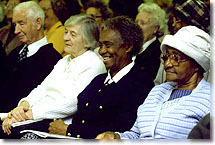
back

|
 |

Seniors Curious of Drug Cards
By Ed Tibbetts, Quadcity Times
February 19, 2004
In about three months, senior citizens can begin applying for the Medicare-endorsed drug discount card.
The card — the first tangible benefit to be offered to millions of Americans from the 2-month old Medicare reform law — is aimed at saving the 10 million senior citizens who have no drug coverage and pay full retail value for their prescription drugs.
The card is a stop-gap measure until the centerpiece of the law takes effect in 2006. But with a short time left to begin enrolling, officials are trying to raise awareness of the card.
U.S. Sen. Chuck Grassley, R-Iowa, hosted a town hall meeting Thursday morning at Genesis Heart Institute, Davenport, to talk about it, as well as other aspects of the program. He was not sure how much interest there is in the card yet, but he said people are beginning to hone in on the overall plan’s details.
“Based on the fact that I don’t have people come up to me and gripe, I think that it’s accepted,” he said, adding that people do not know enough yet about the program to decide whether they will participate.
Shirley Doerscher of Davenport is a good example of that. “It’s something I’m going to have to look into before forming an opinion,” she said.
The main benefit of the plan will allow people to pay a $35 monthly premium and $250 co-pay. In return, they will receive coverage for 75 percent of their drug costs up to $2,250. After that, there is no coverage until out-of-pocket expenses reach $3,600. Then the government picks up 95 percent of the costs. That will not begin until 2006.
In the meantime, the Center for Medicare and Medicaid Services, or CMS, is combing through 106 applications from companies that want to offer the drug discount card. The card is expected to offer savings of 10-25 percent, depending on the drugs the cards cover and the company that offers them. A spokesman said the screening process could be completed in March, and in May applications will be taken.
It is not clear yet which cards will be offered in Iowa, but officials say companies probably will begin advertising soon. But they warn that already some are offering “Medicare-approved” cards. The government says people should be on the lookout for those ads because no cards have been sanctioned yet by the government.
A maximum annual fee of $30 could be charged for the card.
Beginning in May, qualified low-income people (singles with incomes of not more than $12,123 or $16,632 for couples) also can apply for an annual discount of up to $600. Those also will be offered by private companies.
Medicare officials say two to three dozen companies who have applied to offer the card will do so all across the country, easing any fears that rural areas will not be served. States such as Iowa have had little luck getting private insurance companies to offer Medicare health maintenance plans. Peter Ashkenaz, a CMS spokesman, said the new law seeks to ensure participation in rural areas by requiring that companies offering a discount card make sure that 70 percent of the beneficiaries live within 15 miles of a pharmacy.
At Thursday’s town hall meeting, as with U.S. Rep. Jim Nussle’s the day before, people posed a series of questions about the new Medicare plan.
Betty Grandquist, the former executive director of the Iowa Department of Elder Affairs and a volunteer for the AARP, said people still are absorbing the plan’s details, but are happy to see some relief. “People are really glad, but they’re really cautious,” she said. “Iowans are going to stand back and take a good hard look at things before they buy it.”
AARP officials and the Senior Health Insurance Information Program will work to help people decide whether they should participate, and how to do so.
Copyright © 2004
Global Action on Aging
Terms of
Use | Privacy
Policy | Contact Us
|

